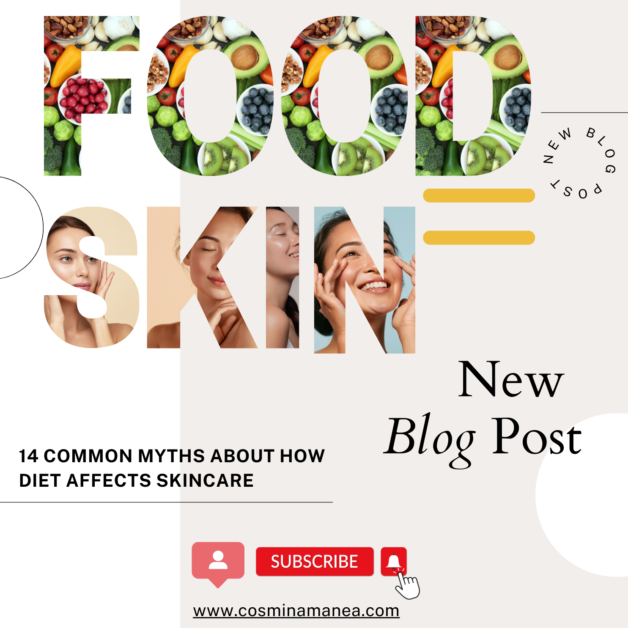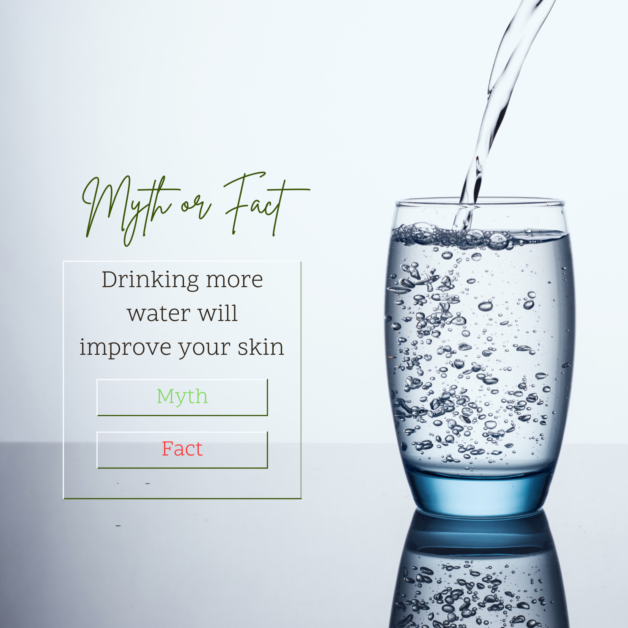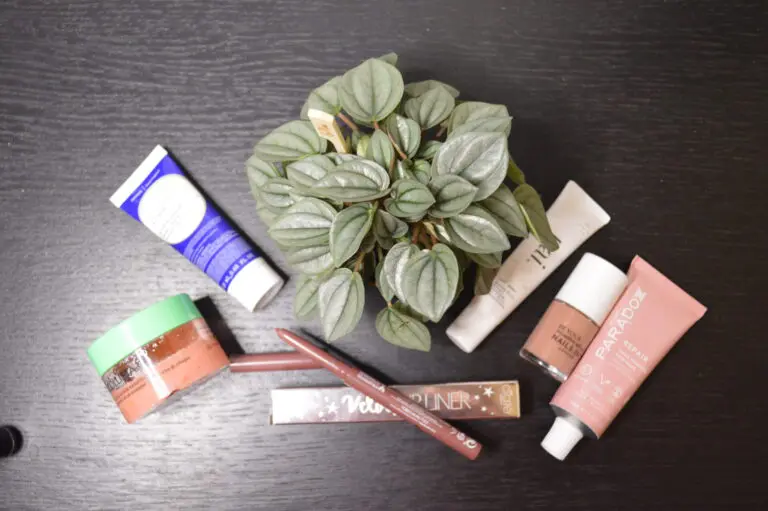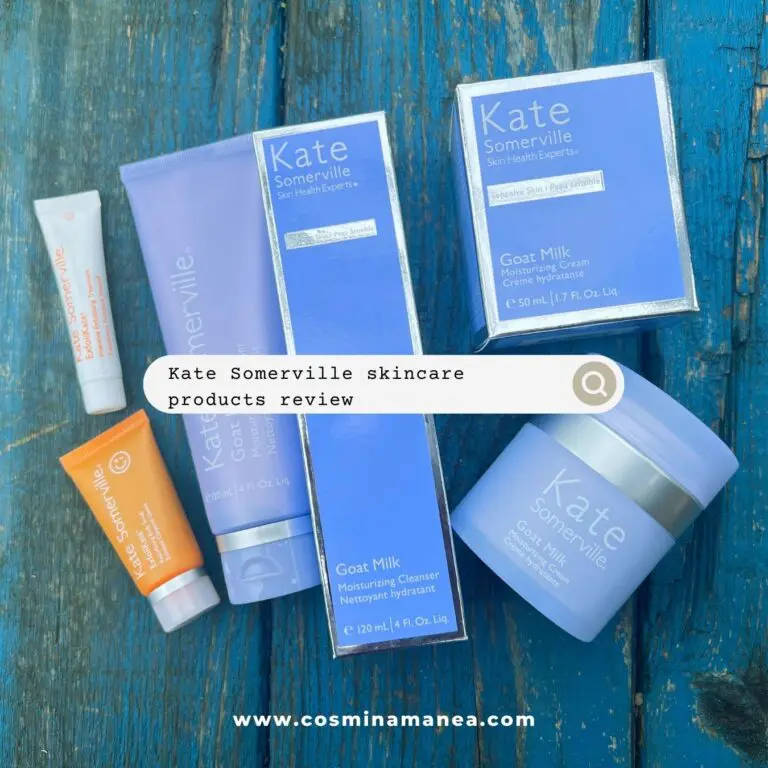14 Common Myths About How Diet Affects Skin Health
It is often said that you are what you eat, and this is often true when considering skin health. Food affects your life from a physical, mental, and emotional aspect. However, even though it might be easy to blame the last night’s burger for the pimple you have in the morning, most food related skincare problems are just myths. Here you have 14 most common myths about how diet affects skin health and their scientifically proof.

Myth 1: The type of diet you have directly affects your skin care
Partially true
Regarding this myth, at first scientists believed there is no link. Then, a few studies trying to link chocolate and acne reversed this opinion. Right now, the scientific opinion is more reserved. But there is a consensus regarding the correlation between food you eat and your overall skin health, especially between foods on high glycemic index and skin problems. However, a correlation is not equivalent with an absolute cause and effect relationship.
Also, the best diet for skin is one that is healthy. By healthy I mean balanced and nutritional at the same time. Diets that are low in carbohydrates, high in proteins, low in calories, or very restrictive cause an increased level of stress. Stress releases cortisol. And cortisol causes skin breakouts. And stress related is also the eating speed. It is scientifically proven that the faster you eat, the fewer nutrients your body absorbs. And this can be observed also on your overall skin health. Eat mindfully and enjoy your food!
Another important point is that any dramatic change in your diet can cause temporary breakouts. It is similar to what happens when you change your skincare products too often. Those blemishes and pimples will disappear in a few days after the detox period is over. So, you should not worry too much about them as they are only temporary.
Myth 2: Avoid fat for healthy skin care
Partially true
It is true that there are some “bad”, saturated fats, that you can find in butter, cakes, baked goods, biscuits, sugary treats, fat meat, sausages, bacon, chorizo, snack foods, etc. Those fats can clog your arteries, raise your cholesterol, and increase your risk of heart disease. Plus they cause skin inflammation, irritation, breakouts, premature skin ageing, and dryness.
Also, touching your face with greasy, oily fingers can indeed cause breakouts, so working In greasy environments will hurt your skin.
However, there is a common misconception that all fats are bad. There are also unsaturated fats, which are very healthy. They lower cholesterol, reduce risk of heart failure and improve skin health when consumed in moderation. Among those, the best are omega-3 and omega-6 fatty acids, which the human body does not produce on its own. So we must take it from diet alone or from food supplements.
Omega-3s especially are key to a healthy skin and hair. They protect against sun damage, reduce acne, prevent irritations, reduce hair loss, boost hair growth. A deficiency of those healthy fats usually manifests itself through puffiness on your face. Plus rough skin, redness, rashes.
The best source of healthy fats for your diet that positively affects your skin health is: fish (among which salmon is especially good for calming skin inflammation), nuts (walnuts, almonds, etc.), seeds (especially flaxseeds and chia seeds), plant oils (avocado oil, soybean oil), edamame, and avocado. I want to give a special mention to walnuts, which boost collagen production and are very rich in omega-3s. They improve skin elasticity, prevent sagging, and leave your skin plump and youthful.
Myth 3: Oily foods cause oily skin
False
There is no scientific correlation between the two. Oily foods are definitely not good for body weight, but they are not to blame for your acne. Oily skin is a product of overall health, hormonal changes, environment, medication, etc. Olive oil, for instance, is 75% monounsaturated fatty acids, which give your skin a youth boost when consumed.
To get rid of oily skin, the solution is a good skincare. Try not to wash your face too often, as stripping your face of its natural oils will only promote more oil production from your skin to compensate. Also, focus on hydration and invest in a good moisturizer.
Myth 4: Dairy products cause acne
Sometimes true
Dairy has the potential to worsen acne, but not for everyone. Also, science has proven that there is a correlation between acne and milk, but not a cause and effect relationship.
What is scientifically proven, though, is that the whey protein, often found in milk-based products, but also in foods consumed as shakes or smoothie bowls by bodybuilders. A good alternative for this protein is the vegan, plant-based protein powder.
In case you think you might have a dairy induced acne, you should first look at your acne type. Dairy-induced acne is a cystic acne: hard, painful bumps under the skin. If you experience this, try to cut dairy for a short period to test for improvement. However, if you cut it for longer periods, you should take into consideration the fact that this will cause a lack of vitamin D and calcium and new health issues. Vitamin D, especially, protects from sun exposure, and a deficit causes wrinkles and discoloration. Best source for this vitamin is dairy products.
Myth 5: Sugar and salt in your diet affects your skin negatively
True
I will start with sugar. It is inflammatory, addictive and negatively impacts the skin and hair through premature and accelerated aging, elasticity loss, low collagen levels, skin dryness, hair loss and lack of volume. The expression “sugar face” denotes a face with deep, carved lines on the forehead. And this is without reason. Sugar breaks down collagen and elastin, which keep your skin firm, taught, and hydrated.
Same applies for salt. High salt consumption can cause skin dryness, bloating, and puffiness. If you struggle with eye bags, try reducing your salt consumption. Iodine can also be a trigger for acne, and common iodine sources you might not take into consideration when planning your meals are shellfish, soy sauce, and cranberries.
Myth 6: Chocolate causes acne breakouts
False
The source of this myth is the fact that chocolate has in its composition both dairy and sugar content, which are bad for skin health eaten separately. However, cocoa is good for skin care. While milk chocolate, with a low cocoa percentage in its composition has no health or skin related benefits, dark chocolate, with over 70% cocoa in its composition, can be a miracle ingredient.
Dark chocolate is rich in antioxidants, which protect the skin and organs, so it can act as a UV barrier. This in turn will delay wrinkle formation and keep your skin healthier.
Myth 7: Drinking water hydrates the skin
False

This is not food related, but water consumption is a diet element equally important. While water is important for overall health, there is no scientific evidence that drinking more water will make your skin more hydrated.
Instead, you should focus on your skincare, and invest in some good moisturizers and hydrating face serums. Also, for your skin, better than drinking water is “eating” it. How can you do that? Through some fruits and vegetables like cucumber, apple, celery, and watermelon. Watermelon in particular is a “magic” ingredient for your diet, as it can reduce water retention, which can lower puffiness around the eyes.
If what you are fighting is skin dryness, another solution can be balancing blood sugar levels. You can do that by avoiding or lowering your intake of refined sugars, simple carbohydrates, and processed foods.
Myth 8: Coffee is good for your skin
False
This myth starts from those studies that say coffee can help reduce hyperpigmentation, but they are not generally accepted by the scientific community yet.
Coffee is not dangerous in and of itself, but it is a diuretic. This means it can cause dehydration and drying of the skin when consumed in large quantities. The advice I can give you is to choose decaf whenever you can.
Myth 9: Gluten on your diet negatively affects skin texture
Partially true
There is no evidence linking clear skin and gluten-free diets. Also, following such a diet can increase stress. Which is scientifically linked to acne. Plus, avoiding gluten can lead you to other nutrient deficiencies, which can cause other eating disorders.
The only situation in which gluten would influence your skin health is if you have a gluten allergy or hypersensitivity.
However, there are some common foods containing gluten which are linked to acne and wrinkles, such as many refined carbohydrates, such as baked products using wheat. A diet rich in carbohydrates is scientifically linked to skin problems, but a gluten-free diet is not.
Myth 10: White rice in your diet negatively affects the skin
True
While many of you will frown upon reading this and ask why Asian people have such clear skin if rice is bad for health, the answer is very simple. White rice lacks nutritional content, so pure sugar enters your bloodstream. Also, white rice is a refined carbohydrate, which is linked to wrinkles and acne, as mentioned in the points above. Unrefined carbs, such as brown rice, might be a better alternative. Scientifically, white rice is linked among the three main foods that increase the risk of breakouts.
Myth 11: Collagen powders in your diet positively affects skin texture
False
Collagen is considered today to be the miracle ingredient for all skincare problems. You can find it in your face cream, skin serum, pills, potions and vitamins, drinks, and treatments. All have collagen. However, if you eat or drink it, it goes to your digestive system, not your skin. If you want collagen to improve your skin texture, you should include it in your skincare products, not in your food.
Myth 12: Smoking and drinking cause skin damage
True
I will start with alcohol. It dilates pores, and dilated pores increase your body’s exposure to microbes, dust, and environmental elements. This exposure leads to inflammation, acne, blackheads, dryness, loss of elasticity, dehydrated skin, rosacea, and wrinkles. The inflammatory effect of drinking alcohol also reflects on your hair health, as your hair will lose strength and volume.
Smoking means your body will be exposed to nicotine, a substance that lowers blood vessel volume, reducing the oxygen and nutrient supply to the skin. This is the reason why frequent smokers have an uneven skin tone and show early signs of aging on their skin. Tobacco changes skin cuticle thickness, accelerates skin pigmentation, and, on very rare occasions, leads to skin necrosis.
Myth 13: Vitamin supplements are good for the skin
True
This is true, especially for vitamin A, B, C, and E supplements.
Vitamin A
Vitamin A prevents aging and regeneration of skin and reduces skin oil production. Also, it helps in treating eczema, acne, and sunburns. A deficiency of vitamin A will manifest itself as dry skin, eyes, and mouth, and rough skin on arms and legs. If you are not a fan of vitamin supplements, you can increase your vitamin A intake by eating more carrots, spinach, broccoli, sweet potatoes, watermelon, kale, green leafy vegetables, as well as liver, dairy, and fish products.
Vitamin B
Vitamin B (actually the whole complex of Bs) promotes the growth of skin cells and helps with discolored patches, acne, redness, inflammation, and infections. A deficiency of B complex vitamins in your diet affects our health and manifest as dry skin and mouth, brittle nails, and coiled hair. Besides the supplements from the pharmacy, you can take your daily dose of B vitamins from green leafy vegetables, seafood, whole grains, seeds, nuts, milk, eggs, red meat, fish, and poultry.
Vitamin C
Vitamin C makes your skin clearer and firmer. It can aid your body in wound and sunburn healing, as well as in the fight with eczemas and acne. Symptoms of vitamin C deficiency are easy bruising, bleeding around hair follicles, gum bleeding, coiled hair, and delayed wound healing. Among the foods rich in vitamin C you can find kale, strawberries, oranges, grapefruit, bell peppers, cauliflower, pineapples, lemons, tomatoes, lemons, etc.
Vitamin E
Vitamin E is a great natural solution for protecting your skin against the environment, including sun damage and environmental pollution protection. Moreover, it enhances skin texture and has anti-inflammatory properties. A deficiency of vitamin E manifests itself as dull and dry skin, wrinkles, and delayed scar treatments. You can find it in sunflower seeds, almonds, avocado, red peppers, asparagus, tomatoes, mangoes, green vegetables, etc.
Myth 14: DIY skincare recipes are better for skin
False
I know this last point has nothing to do with your diet, but it is directly related to the ingredients you keep in your fridge. The intent behind DIY skincare products is good, but they may not always be the best option for your skin. Let me give you some examples to better understand why I make this affirmation.
Home-made face masks and treatments with lemon juice and vinegar are commonly used because of their rich vitamin C content. However, both are also very acidic, which can lead to skin burns, redness, dry skin, peeling, and increased sun sensitivity.
Avocado is considered a fool proof face mask ingredient. However, it can cause severe allergies for people with a latex hypersensitivity. Mangoes, cashews, and pistachios are in the same situation.
Green tea is great for blemishes and scars when used as a toner and flushes out the toxins when drank. Also, it lightens dark under-eye circles. However, applying it directly on the skin can have the same effect as coffee. This is dehydration and increase of fine lines and wrinkles.
Conclusion – Diet affects skin?

Skin improvement through diet is a long-term process, but it is certain that your diet affects your skin overall health. While damaging can happen overnight (for instance if you touch your skin with greasy hands you can wake up with some pimples next day), improvements can last at least a month until they are noticed. It takes at least 27 days for the skin to regenerate, depending on your metabolic rhythm. If you are willing to give diet a try for skin improvement, avoid coffee, sugar, salt, saturated fats, carbohydrates, highly processed snacks, and, of course, junk food. Focus instead on fresh products such as avocados, fish, nuts, seeds, dark chocolate, eggs, olive oil, grapes, broccoli, kiwis, carrots, kale, tomatoes, and green tea.

Do you know any other diet related myths? Please share your thoughts and extra-knowledge in the comments below.
And in case you have skin concerns, remember that you should also always talk with a dermatologist before making any diet change or trying new treatments. Medical advice should always be required from your healthcare professional. Everyone has skin, but not everyone is a skin expert. Ask a dermatologist.
Views: 97








Great article busting myths about diet and skin. Thanks for the info!
The most shocking thing I read was water. Every time I have ever complained to my doctor about dry itchy skin, increase water intake has been the response. Maybe this explains the lackluster results I got.
Water has many health benefits and it is necessary for other body functions to drink as much water as you can, but your skin will not be influenced by the quantity you drink. A nice water based moisturiser applied to your skin might have better results in this aspect.
What an informative read! Skin health is so important and definitely reflects diet, stress, hormones, and environment. My skin used to be more oily or combination with breakouts and cod liver oil was the only thing I found that helped prevent breakouts. Now, after nursing journey, my skin is much more dry! So interesting how things change with many factors. I will take a closer look into some of the suggestions you made and apply them to remedy dryness. As always, healthy diet of mind and body make a huge difference as well! Thank you for the great read!
thank you for taking the time to read through my article and I am glad the information I provided here could help.
I didn’t know some of these. Thanks for putting this out there.